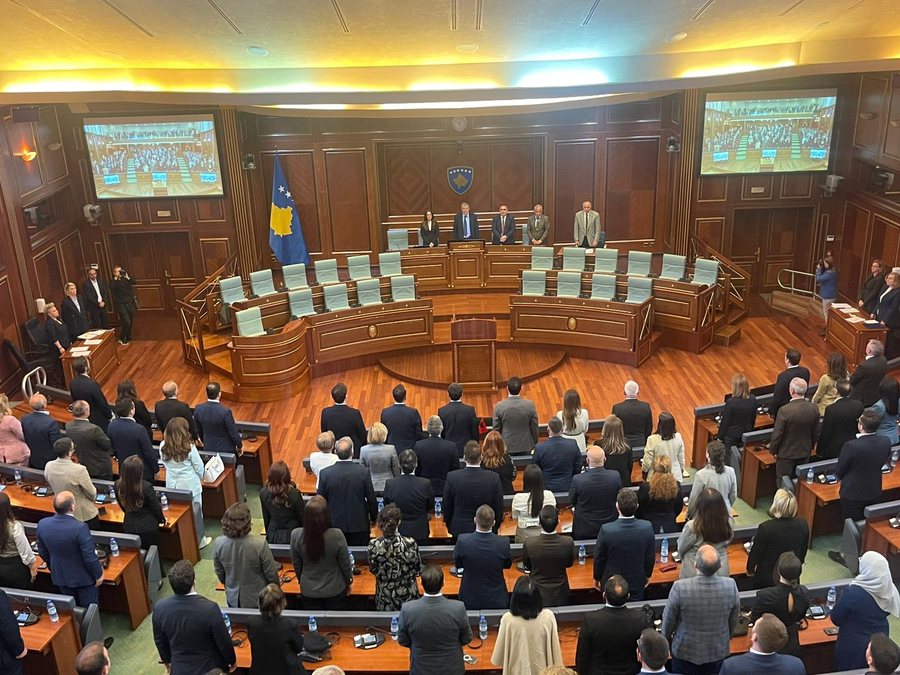
The members of the Kosovo Assembly are meeting today in the eleventh attempt to constitute the new composition resulting from the February parliamentary elections.
So far, MPs have only passed two items on the agenda of the constitutive session: the report of the Temporary Committee for the Verification of Mandates and the oath of MPs.
But the process has stalled at the third point: the election of the speaker of parliament.
The nomination for speaker of parliament is the exclusive right of the winner of the elections, the Vetëvendosje Movement (LVV), but in six votes, its candidate, Albulena Haxhiu, has not managed to receive the necessary votes, namely 61.
On May 3, MPs, for the second time in a row, refused to form a committee for a secret ballot for the new head of the legislative body, who was proposed by the chairman of the constitutive session, Avni Dehari, during the ninth attempt to constitute the Assembly.
In the tenth continuation of the constitutive session, the Democratic Party of Kosovo (PDK), the Democratic League of Kosovo (LDK), the Alliance for the Future of Kosovo (AAK) and the Serbian List again refused to propose a representative who would ensure the smooth conduct of the secret ballot.
MPs from parties that were in opposition in the previous legislature said that the way the LVV is attempting to have the speaker of parliament voted through a secret ballot is unconstitutional.
Before the ninth attempt to constitute the Assembly, on May 1, the leader of the LVV, Albin Kurti, invited the leaders of the PDK and LDK to a meeting.
PDK leader Memli Krasniqi accepted the invitation, but after the meeting he did not announce a deal on how to move forward.
The parties opposing Haxhiu's name for parliamentary speaker have asked LVV to change its proposal for the position, so that the process can be unblocked.
Why is Hajj being rejected?
Haxhiu is being considered a divisive figure by two parliamentary parties: PDK and AAK.
These two entities have requested that LVV come up with another name for speaker of parliament, and AAK has even mentioned two names - Saranda Bogujevci and Shqipe Selimi - from the party of the incumbent Prime Minister, Kurti, whom it has said it would vote for.
LDK, meanwhile, has said that it has no votes for any of LVV's nominees for the position of Speaker of Parliament.
But, LVV has argued that Haxhiu is a deserving candidate and has rejected calls to nominate someone else on her behalf.
The parties, which were in opposition during the previous legislature, have accused the LVV of aiming to impose Haxhiu's vote and "deliberately blocking the process", after arguing that this party does not even have the votes for the new Government of Kosovo - a process that follows the constitution of the Assembly - for the formation of which a simple majority of 61 votes is also required.
But the LVV has said that it is not forcing parties to support its candidate for speaker. The party has said that it is not interested in holding new elections, but is ready for a new electoral cycle as the last option to get out of the current situation.
The LVV has previously proposed that, together with the PDK and LDK, they agree to vote for Haxhiu and the three deputy speakers of the Assembly as a package - while two other deputy speakers belong to minority communities.
In the parliamentary elections of February 9, LVV won 48 seats in the Assembly, PDK 24, LDK 20, AAK-Nisma eight, three of which belong to the latter, and this division of seats in Parliament makes it impossible for each party to govern alone.
The international community is demanding the formation of new institutions, with the European Union saying that Kosovo must quickly form new institutions.
Meanwhile, on April 30, the German ambassador to Kosovo, Jorn Rohde, expressed his concern about the delays in the establishment of institutions. He called on political parties to act quickly in this regard and to put state interests before party interests.
The constitutive session, which began on April 15, can be interrupted and resumed within 48 hours. There is no limit to how many extensions there can be until the legislative body is constituted.
The vote for the speaker and deputy speakers would pave the way for the formation of the new Government of Kosovo. LVV, as the winner of the elections, is the first to propose the mandate for the executive. If it does not form the executive within 15 days, then President Vjosa Osmani has the right to mandate any party that guarantees that it has 61 votes for the new Government of Kosovo.
If the second candidate also fails to form the executive, then Osmani announces new elections./ REL (A2 Televizion)











